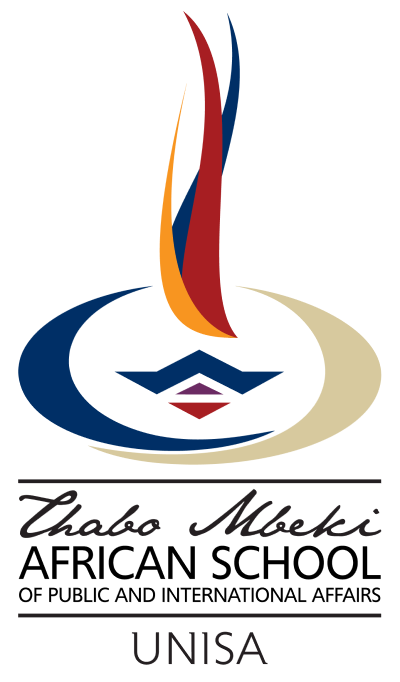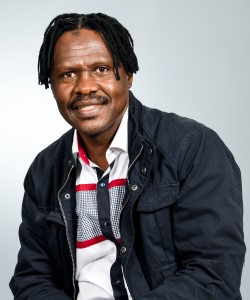

 |
Name | David Letsoalo |
| Position | Director: Academic Support, Student Affairs, Internationalisation & Community Engagement | |
| Contact details | Letsomd@unisa.ac.za | |
| Research interests/expertise | Jurisprudence, Constitutional Law, Contract, Labour & Sports Law, Curriculum Studies and Support, Law-Politics intersection, Internationalisation and Partnerships, and Dispute Resolution | |
| Teaching | Afrikan Renaissance-oriented module, Deconstructing the Africa Vision for Africa's Renewal (part of the Thought Leadership Programme) | |
| Current projects | David Letsoalo is currently seized with the task of developing the student recruitment strategy, consolidating partnership agreements and internationalisation policy, and building the community engagement projects portfolio of the TM-School |
David Letsoalo is a member of the Management Committee of the Thabo Mbeki African School of Public and International Affairs (TM-School). He leads the portfolio/directorate responsible for academic support, student affairs, internationalisation and partnerships, as well as community engagement and outreach. The directorate, thus, covers matters relating to student recruitment, admissions and registrations, student support, support for academics, digital learning, stakeholder relations, and student and staff exchange programmes.
David has been actively involved with the TM-School since 1 May 2020. Prior to his tenure at the TMSchool, he was the Head of the Institute for Dispute Resolution in Africa (IDRA), which was a unit of the College of Law at Unisa. IDRA undertook a vast number of research and community-engaged scholarship activities in the areas of peace and conflict resolution, with specific focus on mediation and electoral disputes. Under his leadership, IDRA forged a remarkable collaboration with the Abuja-based Institute of Peace and Conflict Resolution (IPCR) of the Ministry of Foreign Affairs (Federal Republic of Nigeria). Before his spell at IDRA, he had been a senior lecturer and module leader in the Department of Jurisprudence (Unisa College of Law). David's considerable number of years as a law academic in the College of Law followed his four years of service as a lecturer in the Department of English (Unisa College of Human Sciences) and as a curriculum specialist in the Department of Education (South Africa). It is these experiences that enabled him to make a profound contribution to the establishment and development of the TM-School, specifically on strategic, structural and curricular fronts.
David completed his Bachelor of Arts Degree (English) and Higher Education Diploma at the University of the North. He was a student advisor for two years while at that university. He was also a merit bursary holder of the Educational Opportunities Council (EOC). This was followed by two postgraduate degrees in English Language at Rhodes University. While at Rhodes University, he participated in the in-service education and training of teachers (INSET) programme of the 1820 Foundation as a tutor. Later, he went through the SETI Programme (Fulbright Scholarship) at Ohio University, Athens, Ohio, USA. He also completed a programme in Sports Law at the University of Pretoria (UP). David Letsoalo completed the Bachelor of Laws (LLB) and Master of Laws (LLM) degrees at Unisa. While still at IDRA, he also attended a Programme in Peace and Conflict Resolution at Basel, Switzerland in 2019. This programme covered areas such as, Peace Building and Peacekeeping, Conflict Prevention, Management and Resolution, Mediation and Negotiation, and Alternative Dispute Resolution (ADR) mechanisms, including Arbitration.
As a senior lecturer in the Department of Jurisprudence (Unisa College of Law), he developed and taught the Skills Course for Law Students. The introduction of this massive legal skills course to the LLB module was mandated by the legal profession to deal with the prevailing defects of the LLB curriculum at the time. He also supervised LLB research papers and LLM dissertations in the areas that included constitutional law, labour law, law of contract and legal education. David is also one of the authors of a Law textbook, Introduction to Law and Legal Skills in South Africa (2012, Oxford University Press).
Since 2019, he has been the deputy editor and member of the Editorial Board of the accredited and peer-reviewed transdisciplinary, Journal of Law Society and Development (JLSD) and a reviewer for the International Journal of African Renaissance Studies. He is a member of the Founding Committee of the Southern African Security Journal. David Letsoalo is an editor and critical reader of many journal articles, master's dissertations and doctoral theses covering a variety of disciplines. This contribution extended to biographies, reports and policy documents. He presented a number of papers at conferences and seminars on various areas including labour law, sports law, constitutional law, politics, curriculum transformation, decolonisation, Sankarism, indigenous knowledge systems (IKS), elections and electoral disputes. He has overseen, negotiated and drafted a number of significant memoranda of understanding and/or partnership agreements involving Unisa on behalf of the College of Law and TM-School. Some of these partners included the National University of Lesotho (NUL), Mekelle University (Ethiopia) and University of Addis Ababa (Ethiopia). He is very passionate about the notion of internationalisation, given the fact that the TM-School has positioned itself as a premier graduate African School with global significance. Amongst many initiatives, he is a founding member and chairperson of the prestigious Annual Spring Law Conference, a cross-disciplinary project of Unisa College of Law. He is an ardent pan Afrikan community activist and philanthropist dedicated to addressing social ills through education, political and human rights awareness, culture, arts and sports projects. David is a highly respected negotiator and mediator.
His views and opinions on Pan Afrikanism, politics and liberation history have been highly sought by various sectors of the society, including the mainstream media.